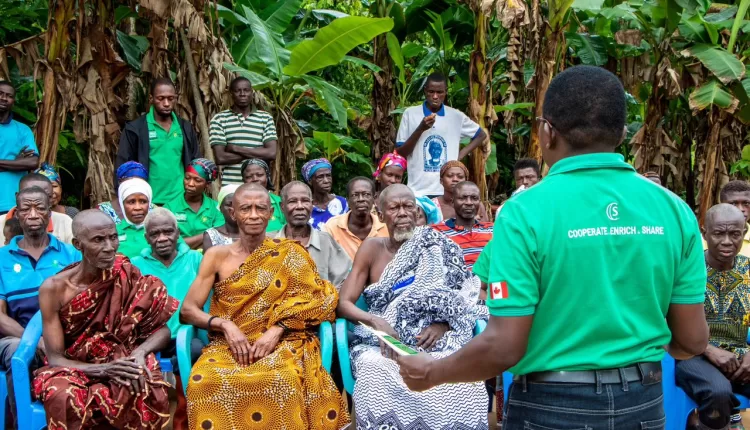The Board Chairman of the Ghana Cooperative Council, Dr Bernad Bingab, has encouraged African leaders to adopt the agricultural cooperatives model for improvements in both food security and economic development across the continent.
Implementing this model, according to him, has the potential to boost food production and improve the socio-economic conditions of farmers across the continent.
Dr Bingab was addressing a National Dialogue on Cooperative Development themed “Promoting Cooperatives for Sustainable Development” in Accra, organised by SOCODEVI, an NGO dedicated to enhancing the living conditions of smallholder farmers.
Driving force to empower farmers
Dr. Bingab said Ghana has fallen short of its average annual cocoa production target of 800,000 metric tonnes for two consecutive crop seasons.
This shortfall has negatively affected local processing and export, hence the need to embrace the cooperative model to address significant challenges faced by farmers, such as low crop yield, inadequate income, and the misuse of pesticides and fertilisers.
“Cooperatives would equip farmers with the productivity and management skills that will improve their livelihoods and help generate additional income from cocoa premiums and other sustainable sources,” he said
The Cooperatives Council also emphasised that the model will guarantee the well-being of cocoa communities, particularly smallholder farmers, by enhancing productivity.
The Deputy Secretary General of the General Agricultural Workers Union (GAWU), Andrews Tagoe, asserted that the establishment of robust agricultural cooperatives is the driving force empowering farmers in Ghana and throughout Africa.
“The cooperative model provides a lot of opportunities, such as jobs and economic growth. It is incumbent on African leaders to create an enabling environment through formulating the right policies that seek the welfare of smallholder farmers,” he underscored.
Tagoe believes that Ghana possesses the capacity, encompassing both human and natural resources, to advance the agricultural cooperative initiative further than its current status.
Concerns over declining membership
On his part, Ishmael Pomasi, Chairman of the Cocoa Abrabopa Association, highlighted a significant decline in the membership of their association.
He attributed this decline to various detrimental government policies that impacted the association, thereby contributing to the decrease in membership.
“Our association, since its inception in 2006, has enjoyed a membership strength of 20,000 but currently only boasts 8,000 members because of inconsistencies in policy implementation in our country, hence the reducing numbers,” observed Pomasi.
The Programme Manager for Solidaridad’s Reclaim Sustainability!, Seth Kankam Nuamah, is, therefore, advocating for partnerships to fortify farmer groups in establishing a regional and national cooperative association.
This initiative aims to enhance farmer participation in decision-making processes, he said, adding, “We are committed to supporting the capacity agenda enabling cocoa farmers to participate in decision-making and also make decisions in their interest.”
Senior Director, External Affairs, Cooperatives and Mutuals, Canada, Daniel Brunette, shared the cooperative experience in Canada, saying:
“The cooperative initiative in Canada contributed $49.2 billion to the country’s GDP in 2019 and provided 592,000 full-time jobs; this is the model we want to replicate in Africa.
We have built our own seed cleaning factories and processing plants, our own grocery stores, gas stations, and agrochemical centres, among others, in our various communities.”
The Country Director of SOCODEVI Ghana, Nicolas Demers-Labrousse, underscored his organisation’s dedication to involving numerous farmer groups in the cocoa value chain.
He said their commitment is aimed at fostering an inclusive, self-sustainable, and profitable enterprise that significantly contributes to reducing the vulnerability of families in the sector.
SOCODEVI Ghana supported some 150 communities in the Ashanti and Western North Regions of Ghana with capacity building and hands-on training about the agricultural cooperative model.
- Cocoa Civil Society Urges EU to Invest in Deforestation Regulation - June 12, 2024
- West African Leaders Must Strengthen Trade and Price Mechanism - April 29, 2024
- Cote d’Ivoire-Ghana Cocoa Initiative Opens Permanent Office - April 20, 2024
